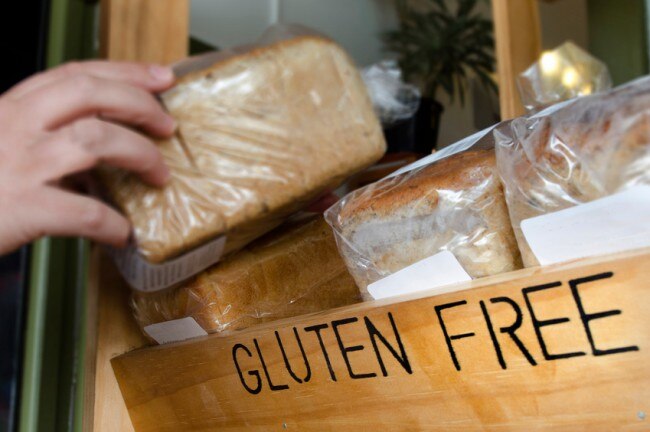In a world where grocery store shelves are piled high with gluten-free foods and even body care products, it’s safe to say that celiac disease has become a hot topic. But even with all the studies out there, many of us are still confused when it comes to what celiac disease is and whether or not we should be following a gluten-free diet. We sat down with CEO Chuck Marble from Ian’s Naturals to learn everything there is to know about gluten including cross-contamination in packaged foods, symptoms, common mistakes and more.
What’s the difference between gluten intolerance, allergy, sensitivity and celiac disease?
Celiac disease is not a food allergy but an autoimmune disorder that causes damage to the small intestine, which can lead to malabsorption of nutrients. Symptoms include nausea, heartburn, stomach pain and gastrointestinal issues.
Food intolerances and sensitivities are adverse reactions of the digestive system to certain substances. The most common is lactose intolerance, which affects approximately 50 million Americans.
A food allergy is an immune system response when the body mistakenly identifies a protein as harmful. For example, someone may go into anaphylactic shock after consuming peanuts.
Gluten sensitivity is a fairly new topic, and more research is needed. Often a diagnosis is prescribed when celiac test results are negative; yet, when gluten is removed from the diet, patients respond with fewer symptoms. New research suggests that gluten alone may not be responsible for the symptoms, and individuals typically are asked to monitor and remove certain foods to determine sensitivities. Symptoms may be non-GI, such as headache, “foggy mind,” joint pain and numbness in the legs, arms or fingers.
Is it possible to have celiac disease without symptoms?
Yes, it is possible! This is known as asymptomatic celiac disease. There are many cases where people without symptoms still have intestinal damage from ingesting gluten and do not feel sick. Celiac disease can be developed at any age in life. My very own mother was diagnosed at age 81! The severity can vary depending on age, diet, environmental conditions and overall health.
How do I know if I’m having issues with gluten?
Gastrointestinal symptoms include, but are not limited to: diarrhea, fatty stools, constipation, cramps, bloating, flatulence, nausea, malabsorption and anemia. Non-gastrointestinal issues include as fatigue, depression, joint pain, muscle cramps and peripheral neuropathies.
When embarking on a gluten-free journey, what are the first steps?
First, be sure to consult your doctor. If there is any suspicion of gluten sensitivities, or celiac disease, do not restrict gluten until tested. Many individuals produce false negatives because they go on a gluten-free diet and then try to get tested. Damaged villi in the small intestine may actually heal over time, resulting in a false-negative test.
What are some common mistakes people make when trying to follow a gluten-free diet?
A common mistake is not consuming a balanced diet. A balanced gluten-free diet is rich in fruits, vegetables, healthful fats, nuts, gluten-free grains and protein. It’s a great idea to consult a registered dietitian, as some people may need treatment for vitamin and/or mineral deficiencies. Those with anemia may need iron, B12, and/or folic acid supplementation. Many gluten-free products are not fortified with iron and folic acid.
Is going gluten-free beneficial if you don’t have celiac disease?
This is a very controversial topic mixed with facts and emotions. Human nutrition is a very complex subject because everyone’s lifestyle, diet and genetics are different. Researchers have identified correlations between what an individual chooses to consume on a gluten-free diet and what they chose to eat prior. If one is following a gluten-free diet and replaces a previous diet of refined carbs and snacks with high caloric content, they will lose weight and feel better. The food industry has responded with many products in the cookies, crackers and snack category. So, once again, regardless of gluten content, moderation and healthy eating is critical.
How can cross-contamination affect someone with celiac disease?
Cross-contamination occurs when an unintentional substance is transferred to another. This term formerly was used only when describing the cause of microbes or bacteria contaminating a food item. Now, it may refer to allergens, proteins or any unintended substance. Contamination can happen during the packaging process, at the store or even at home. Individuals with serious celiac disease often use separate toasters to prevent cross-contamination of gluten on toasted items.
Is it necessary to switch to all gluten-free products including skincare, etc.?
The gluten protein is too large to be absorbed by the skin, and traditional definition is the autoimmune response in the small intestine. That being said, if a person is extremely sensitive, and there is a potential to ingest the product, caution should be used such as opting for a gluten-free toothpaste. Again, if you’re unsure about anything, consult your doctor for advice.
Contributed by Chuck Marble, CEO of Elevation Brands.

